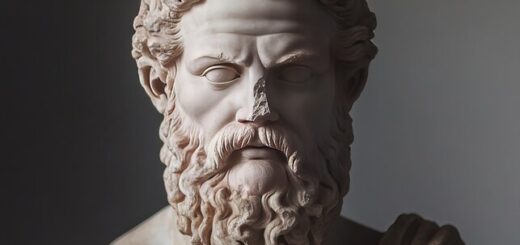Epicureanism and the Problem of Evil
Epicurus (341-270 BCE), one of the greatest philosophers of the ancient world, founded a school of philosophy at the age of 32 and laid the foundations of Epicureanism. In 306 BCE, he moved his school to Athens, which was named the “Garden of Epicurus,” and it remained active for more than eight centuries. The school was the first in Ancient Greece to admit female students.
According to Epicurus, the primary criterion for truth is the senses, and the only reliable source of information is feelings. Although feelings can be misunderstood, they never deceive us. This philosophy aligns Epicurus with the empiricists.
Like Democritus, who supported and developed atomic theory, Epicurus believed that the universe was created through the collision and separation of atoms. He argued that the same process occurs in living beings. Everything is made of atoms, and the space between atoms is void. An infinite number of atoms and voids, therefore, results in an infinite universe. In this infinite universe, there must be infinite worlds. This is absolute.
The main goal of Epicurus’s philosophy is to show humans the path to happiness. For this, a person must become a noble human being. The highest human, according to Epicurus, is the wise one. Such a person must study and understand nature, for through this, they will be freed from physical matter and the fear of death.
The wise person must live a tranquil life, where power, state, and fame are of no importance. People should enjoy life, and a pleasurable life is one that is free of physical pain, free from fear of death and gods. This is the purpose of philosophy. According to Epicurus, there is no need to fear death. The philosopher says, “Do not fear death. It has no relation to us. For life and death never meet. While we are alive, there is no death, and when we are dead, there is no life. Therefore, death has no connection to the living or the dead.”
Epicurus considers the desire for pleasure to be natural. Pleasure is the absence of pain and suffering. However, a pleasurable life is not found in wine or physical indulgence. A beautiful life is made possible by proper thought, a just, and noble way of living.
Epicurus distinguishes three types of desires: natural and necessary desires, which include food and shelter. These are easily achievable, and through them, a pleasant life can be attained. The next type of desires are natural but unnecessary, such as more or better food. Finally, there are empty desires, such as power and wealth. These desires are never fully satisfied because humans always want more. Therefore, for a pleasant and pleasurable life, desires should be minimal, achievable, natural, and necessary.
Epicurus’s ethics will be revived in the Renaissance period centuries later. Spinoza, French, and English philosophers, as well as intellectuals, will revitalize and develop his ideas.
Epicurus was the first to formulate the problem of evil, which remains relevant from his time to the present. This problem explores the coexistence of suffering and evil in a world with an all-powerful, all-knowing, and benevolent god. Epicurus expresses this problem, also known as the “Epicurean Paradox,” in the following manner: “God wants to prevent evil, but cannot. Therefore, he is not all-powerful. God can prevent evil but does not want to. Therefore, he is not benevolent. God wants to prevent evil and does, but then where does evil come from? God can neither prevent evil nor does he want to. Why, then, do we call him God? [1].
Despite this, Epicurus emphasizes the existence of gods. However, these gods are indifferent to human concerns and do not interfere in human life. This idea is similar to deism from the Renaissance period. Deism accepts the existence of a supreme being who created the world but does not intervene in human affairs; this being merely set the universe in motion and then remains apart from it.
Like Xenophanes, Epicurus opposes the idea of gods resembling humans. According to the philosopher, the gods are beings with perfect morals who live among the distant stars. The god is the ideal of the noble and wise human, who, among humans, is akin to a god.
The problem of evil, formulated by Epicurus, remains relevant in all religions and centuries. Over time, the problem of evil was also applied to the animal kingdom. Darwin expresses this problem as follows: “The suffering of millions of animals over what could be considered infinite time does not seem to be compatible with the existence of a benevolent creator. [2]”
Many philosophers, from ancient times to the present, have pondered this issue and proposed various theories and solutions. However, the paradox formulated by Epicurus still remains unresolved.
[1] Hickson, Michael W. (2014). “A Brief History of Problems of Evil”.
[2] Michael Murray. Nature Red in Tooth and Claw: Theism and the Problem of Animal Suffering


